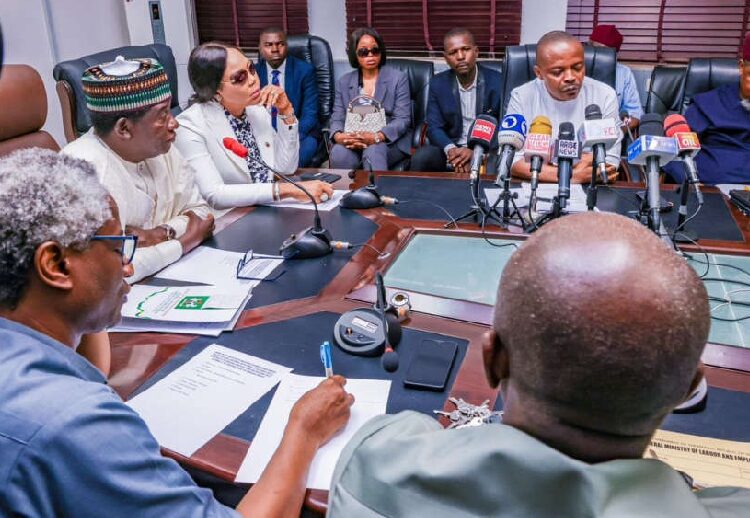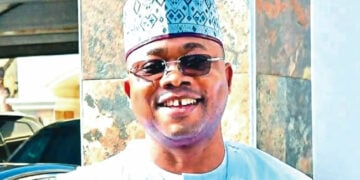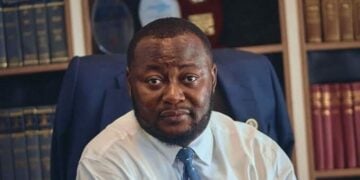Top federal government officials have kept their lips shut on the new national minimum wage proposal submitted yesterday to President Bola Ahmed Tinubu by Wale Edun, the minister of finance and coordinating minister of the economy.
It was similar with organised labour officials when LEADERSHIP Friday contacted them on the issue. They, too, would not volunteer information.
The only information offered by a source close to the president of the Nigeria Labour Congress (NLC), Joe Ajaero, was a rebuttal of claims that the minister proposed N105,000 as minimum wage to the president.
The presidency also said the amount published by some online platforms as the new minimum wage was untrue.
Even the minister of state for labour and employment, Hon Nkeiruka Onyejeocha, who attended yesterday’s government-labour meeting, declined to tell journalists what transpired at the parley.
The minister, a member of the Tripartite Wage Negotiating Team, dodged questions put to her during a chat with journalists.
Her response to one of the questions was: “Why are you asking what is unnecessary?” (referring to the figure submitted to the president).
Pressed further, she said, “Wait for the conclusion of our negotiations.”
In his report, Edu presented President Bola Tinubu with the projected cost implications of implementing a new national minimum wage.
The submission came just two days after Tinubu issued a 48-hour directive to Edun to present a proposed new minimum wage figure and analysis of the associated costs.
The finance minister’s report outlines several potential new minimum wage levels along with the anticipated fiscal impacts on the federal budget of each option.
In his reaction to the rumoured N105,000 rate, the special adviser to the president on information and strategy, Bayo Onanuga, said there was no truth in it.
Onanuga refuted the claims in a post on his X handle yesterday.
He wrote: “The honourable minister of finance and coordinating minister of the economy, Wale Edun, has not proposed N105,000 minimum wage. The contrary story being disseminated is false.”
LEADERSHIP Friday recalls that the federal government and the Organised Private Sector had presented N60,000 as the new minimum wage, but organised labour rejected it.
Consequently, on Monday, members of the Nigeria Labour Congress (NLC) and Trade Union Congress (TUC) embarked on an indefinite nationwide strike to press home their demands for a new national minimum wage and a reversal of the recent electricity tariff hike. This development paralysed activities in both public and private sectors across the country.
The next day the organised labour and the federal government reached a resolution to further engage daily for the next one week at the level of the Tripartite Committee on National Minimum Wage until a final agreement is reached.
This came after the federal government assured the Labour leaders that President Tinubu was committed to paying a new monthly minimum wage above the initial offer of N60,000.
North Central Council Flays NLC, TUC Over High Wage Demand
Meanwhile, the North Central Citizens Council (NCCC) has strongly condemned the reckless agitation of the Nigeria Labour Congress (NLC) and her counterpart, the Trade Union Congress (TUC) for an unreasonable increase in the minimum wage of Nigerian workers.
The NCCC, in a statement by the coordinator, Comrade Mohammed Eneji, termed the efforts by the labour unions in forcing the federal government to succumb to their terms in the negotiation process as inhuman and selfish as this will have an adverse effect on the common man who does not earn salary.
It said if the minimum wage of workers is jacked up without considering the adverse effect it will have on the ordinary citizens of the country, especially those living in the rural areas, then the effort will be counterproductive and useless.
It said if many state governors are still battling to pay the N30,000 minimum wage, “how then do we think that the governments both at state and local government levels will be able to pay the minimum wage of 60,000 and above?”
It said the labour movement is obviously not putting Nigeria and Nigerians first in this process of the negotiation and, as such, NCCC demands that the labour leadership reviews and considers the plight of the larger percentage of Nigerians who are not under the payroll of the government, nor the private sector, as this percentage of Nigerians constitutes the largest population of workforce in Nigeria compared to those under government employ who are less than 1% of the entire Nigerian population.
“We also demand that the Labour be flexible by looking at the bigger picture as this demand of theirs will further heighten the inflation rate in the country and also increase the unemployment rate, for as a result of the increase in the minimum wage, many multinationals and government agencies at state level may result in downsizing the personnel on their payroll due to inability to pay the new wage.”
Meanwhile, the chairman of the Progressive Governors Forum, Hope Uzodimma, has said the negotiation between government and organised private sector is not all about Nigerian workers, but also the sovereignty of the country.
Uzodimma said at the end of the day, both parties would come to an agreeable terms that would be in the overall interest of everyone.





